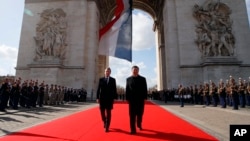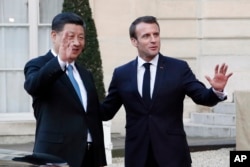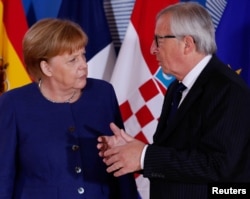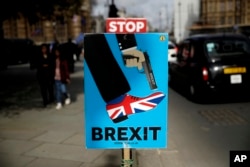Chinese President Xi Jinping has been treated to a sumptuous dinner near Nice and an official welcome by his French counterpart at the Arc de Triomphe in Paris — not to mention a 17th-century French translation of Confucius.
But Xi's three-day visit to France, which began Sunday, promises to be a much bigger challenge than his past two stopovers. The Chinese leader coasted on the first leg of his European tour, marked by getting Italy on board his "Belt and Road" project, and a friendly welcome in the tiny Riviera principality of Monaco, which agreed to let Chinese technology company Huawei develop its controversial 5G telecommunications network.
His third leg will test both Xi and French President Emmanuel Macron, who has cast himself as one of Europe's strongest champions. For Xi, analysts say, the goal is not just to broaden Chinese economic ties, but also political clout in Europe in the face of other major global competitors. For Macron and his allies, it means coaxing a fractured bloc to speak in a single voice when it comes to doing business with China.
"It's in the Chinese interest that Europe is not divided, that we remain a leading partner," Le Journal du Dimanche newspaper wrote, summing up what it described as Macron's thinking about China's relations with the European Union, its biggest trading partner.
Monday's agenda included inking energy, food and transport deals, followed by a state dinner for Xi hosted by Macron at the Elysee presidency. Besides trade, the two leaders were also expected discuss climate change, with Macron reportedly seeking greater Chinese cooperation to counter Trump administration skepticism.
The bigger business comes Tuesday, when German Chancellor Angela Merkel and European Commission President Jean-Claude Juncker join Macron in Paris for talks with Xi.
The French president has already set the tone, declaring Friday "the time for European naivete is over" — a sentiment echoed by fellow EU powerhouse Germany.
"We want a relationship based on reciprocity," Merkel said. "If one side has access, then the other side should, too."
But European solidarity may be undermined by more than a dozen individual trade and investment agreements struck between China and EU member states, from Poland and Portugal, to Greece and the Czech Republic.
"If Paris, Brussels and Berlin are on the same page, it's not certain that everyone will follow them," France's Le Monde newspaper wrote. "Scandinavian countries are reticent ... those in the south — Italy, Portugal, Greece ... need Chinese investment."
Indeed, earlier this month, Malta signaled it might be the next contender.
"One has to be wary of any country, especially with political ambitions or any sort of ambitions," Maltese Finance Minister Edward Scicluna told CNBC, "but that's life."
Also described as the new “Silk Road,” China's strategy of infrastructure development and investments now spans more than 150 countries. Chinese yuan have helped to bankroll new trains, roads and ports around the globe — crucial additions, especially for developing nations, and key instruments to expand Beijing's economy and global leverage.
Win-win deals — or are they?
China calls the initiative a "win-win" deal. But critics note the infrastructure projects have indebted some African and Southeast Asian nations and rendered strategic assets, including ports in Djibouti and Greece, essentially under Chinese control.
Already weakened by Brexit and internal political divisions, Europe's ability to handle China in a unified way may be put to the test at an EU-China summit next month.
The European Union has drafted an official strategy calling on member states to pressure Beijing for greater accountability and transparency in its business dealings. Yet that might be undermined by another reality; China's effectiveness "at dividing and conquering EU member states by targeting them individually," wrote University of Bristol East Asia expert Winnie King in The Conversation.
Francois Godemont, an Asia expert at the Montaigne Institute in Paris, believes Xi's priorities on this trip are not only economic, but also to "disarm" a skeptical Europe and further distance Brussels from Washington before more U.S.-Chinese trade talks next month.
"Seen from China, trade deals are a footnote," he added in an interview Monday with France-Info radio.
Another French analyst, Sylvie Kauffman, argues Xi's visit underscores a much bigger threat as other powers — including Russia and the United States — also seek to undermine European unity.
"Europeans need more than a wake-up call," Kauffman wrote in the The New York Times. "They must decide whether they can contemplate the prospect of their continent being cut up piece by piece by competing bigger powers, or whether they want to regain enough collective strength and common sense to control their own destiny."








